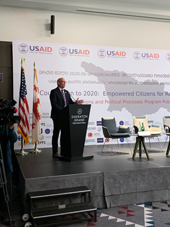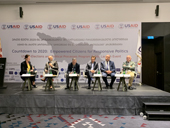
USAID Georgia launches Elections and Political Processes Program
By Inga Kakulia
Monday, October 21
USAID introduced the new project aimed at enhancing the democratic election process on October 18th. The event was attended by the Speaker of the Georgian Parliament, Archil Talakvadze, as well as Elizabeth Rood, Chargé d'affaires and Tamar Zhvania, Central Election Commission Chair.
Elizabeth Rood opened the event and called the recent changes to the election system the most significant electoral reform since Georgia’s independence. According to the Chargé, US applauds the decision to bring about these changes and stated that the election management bodies need clear guidance for implementing these new reforms, and the new program adapts a new approach to promote more responsible politics and citizens rights. In Addition to the three NGOs that have long been partners of USAID, this year 6 new Georgia NGOs are teaming up with USAID to broaden the representation spectrum. The news NGOs include the Georgian Institute of Politics (GIP).Eastern European Centre for Multiparty Democracy (EECMD).Georgian Young Lawyers Association (GYLA).International Society for Fair Elections and Democracy (ISFED).Public Movement Multinational Georgia (PMMG).Transparency International Georgia (TI).
During his speech the Speaker of the Parliament, Archil Talakvadze thanked the US for longstanding productive partnership with Georgia, and also encouraged youth to engage more in civic activities.
The Youth Engagement was one of the focus points of the event, with multiple young representatives from different political parties and NGOs.
Peter Wiebler, USAID/Georgia Mission Director delivered a brief overview of the project.
The project aims to strengthen democratic parties, boost political inclusion, increase citizen engagement and level the electoral playing field.
During the event, the attendees were able to anonymously answer the questions posed by the moderators. Overall positive attitude towards the changes to the electrical system was obvious but concerns were also raised.
During the first panel, the speakers discussed the possible challenges of the proportional system and 0% threshold. The topic of extremist ideologies entering the parliament was discussed and the audience also agreed that the proportional system increases the chances of extremist political parties entering the parliament. But on the other hand, new political faces and parties getting a chance to enter the politics were largely welcome by the speakers and audience alike.
During the second panel topics of minority inclusion and monitoring during the election process were discussed. Arnold Stepanian from the Public Movement Multinational Georgia discussed the experience of ethnic minorities in the election process while Levan Natroshvili from Transparency Georgia talked about the involvement of young people in the monitoring processes and some challenges that Georgia still faces in that regard, such as some observers lacking the experience or being affiliated with some political parties.
John Dipirro, Resident Program Director at the International Republican Institute (IRI) closed the event and once again highlighted the importance of civic participation. Mr. Dipirro stated that no real progress can be made without the involvement of the people.
During the event, all the necessary information about all the NGOs working with the USAID and the ways to connect with them were discussed, as to promote further involvement and to encourage everyone but especially young people to take action and join forces and communicate with these organizations.


